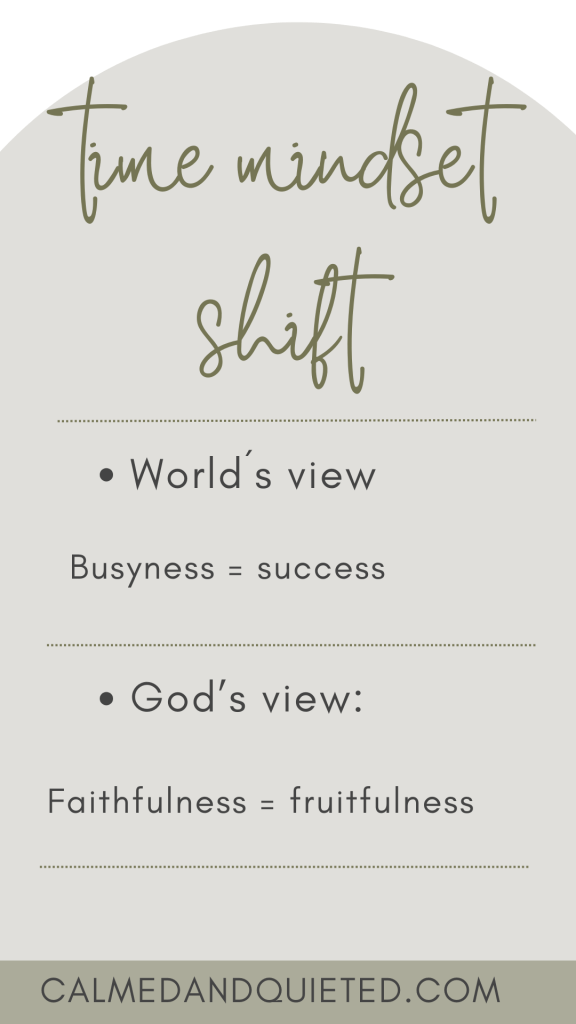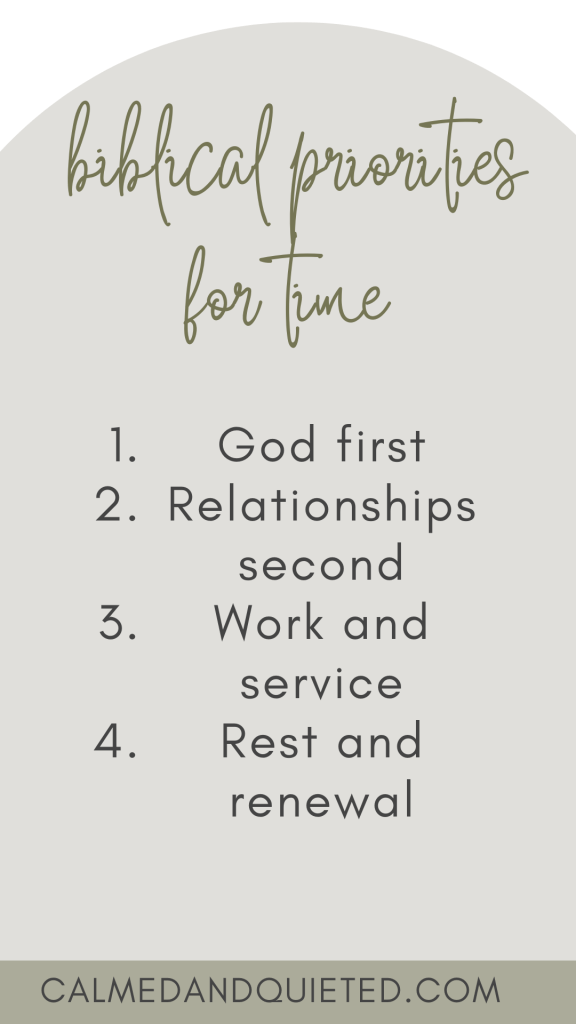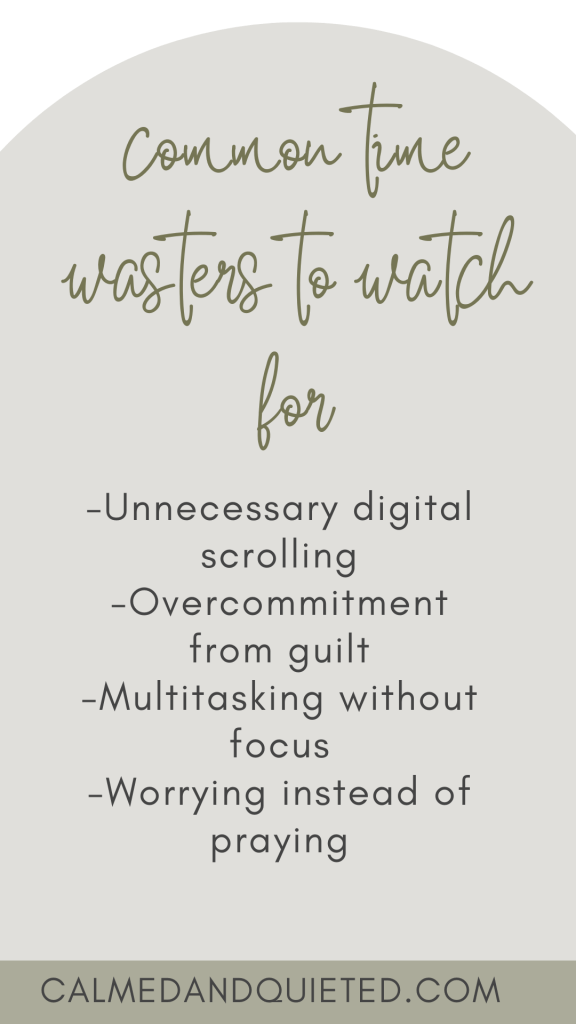
Biblical Time Management: A Practical Guide for Christian Women
Introduction: Why Time Management Matters to God
Busyness is everywhere. Our calendars overflow, our phones never stop buzzing, and our minds rarely find rest. For many of us, time feels like sand slipping through our fingers — no matter how hard we try to hold onto it.
But Scripture paints a different picture. Time isn’t something to conquer or control; it’s a gift. The psalmist prays, “Teach us to number our days, that we may gain a heart of wisdom” (Psalm 90:12). In other words, how we spend our hours reveals the posture of our hearts. Time management isn’t simply about productivity; it’s about stewardship, wisdom, and worship.
This guide will walk you through biblical principles for managing your time, paired with practical steps you can live out day by day. Whether you feel overwhelmed by deadlines, pulled in too many directions, or just longing for more peace in your routines, here you’ll find a rhythm grounded in God’s Word.
Time doesn’t have to be your enemy. By seeing it as a gift and managing it God’s way, you can trade hurry for peace and chaos for purpose.
╔══════════════════════════════╗
🌿 Grace note
“Time is not yours to master, but God’s to entrust. Every day is a gift; live it with wisdom, not hurry.”
╚══════════════════════════════╝
2. God’s Design for Time
“In the beginning, God created the heavens and the earth…” — Genesis 1:1
From the very first page of Scripture, we see that God values order and rhythm. Creation unfolded in days, not seconds. Work and rest were woven together. And on the seventh day, God rested—not because He was tired, but because He was establishing a holy pattern for us to follow.
Time, then, is not random. It’s purposeful. God marked seasons, set the sun and moon to govern days and nights, and gave Sabbath as a gift of rest and trust. Ignoring these rhythms often leads us into burnout and frustration.
Biblical time management means aligning our schedules with God’s design: balancing diligence with stillness, productivity with worship. When we follow His pattern, time becomes less about rushing and more about living with steady faithfulness.
Practical Takeaway: Ask yourself: Does my current rhythm reflect God’s rhythm of work and rest? If not, identify one small adjustment this week (like pausing for Sabbath rest or starting the day with Scripture) to realign your time with His design.
🌿 God’s Rhythm for Time
God´s Design
- Work (6 days)
- Rest (1 day)
- Seasons
Our Response
- Diligence and service
- Trust and renewal
- Acceptance of timing
3. Stewardship of Time: A Biblical Responsibility
“Be very careful, then, how you live—not as unwise but as wise, making the most of every opportunity…” — Ephesians 5:15–16
Time is not something we own; it’s something God entrusts to us. Just as the parable of the talents reminds us to invest wisely (Matthew 25:14–30), our hours and days are resources to be stewarded faithfully.
Stewardship means accountability. One day, we’ll give an account of how we used the time given to us — whether for God’s glory or for distractions that pulled us away. That truth isn’t meant to create fear but to inspire intentional living.
When we treat time as a sacred trust, small daily choices suddenly matter: the conversations we prioritize, the work we put our energy into, and the margins we protect for prayer. Biblical time management is less about squeezing in more and more, and more about investing in what carries eternal weight.
Practical Takeaway: Take 15 minutes this week to audit your time. Write down how you spent yesterday’s hours. Then ask: Did I steward them in a way that honored God? What one adjustment could bring my time closer to His priorities?
Helpful reads:
Download your Reminders for Stewarding Time card (phone-friendly)

4. The Problem of Busyness and Hurry
“But Martha was distracted by all the preparations that had to be made. She came to him and asked, ‘Lord, don’t you care that my sister has left me to do the work by myself? Tell her to help me!’ ‘Martha, Martha,’ the Lord answered, ‘you are worried and upset about many things, but few things are needed—or indeed only one.’” — Luke 10:40–42
Our culture praises busyness. The fuller the calendar, the more “successful” we appear. Yet Scripture warns us that hurry and distraction often choke out what matters most. Martha wasn’t sinning by serving, but she was consumed by hurry. Mary, by contrast, chose stillness at Jesus’ feet.
Busyness is not the same as fruitfulness. One leaves you drained; the other leaves you at peace. When hurry drives our days, we miss the presence of God and the people right in front of us.
Practical Takeaway: Ask yourself: Am I busy, or am I fruitful? This week, consider removing one non-essential task from your schedule to create space for rest, prayer, or relationship.
🌿 Busyness vs. Biblical Fruitfulness
Busyness
- Driven by hurry
- Constant activity
- Overcommitted
- Drains energy
Biblical Fruitfulness
- Guided by peace
- Focused presence
- Rooted in priorities
- Renews the soul
5. Renewing Your Mind About Time
“Do not conform to the pattern of this world, but be transformed by the renewing of your mind.” — Romans 12:2
Time management isn’t just about better systems; it begins with a renewed perspective. The world teaches us to squeeze productivity into every corner of our day, to value busyness as success. But Scripture calls us to think differently — to see time as a tool for worship, service, and peace.
When your mind is renewed, you stop asking, “How much can I fit in today?” and begin asking, “What is God calling me to focus on today?” This shift takes the pressure off. Productivity becomes less about proving your worth and more about aligning with God’s will.
Practical Takeaway: Before planning your week, pause to pray through Romans 12:2. Write down one “worldly mindset” about time you want to let go (like “I must always be available”) and one truth to replace it (like “My worth is in Christ, not my schedule”).
Helpful reads:
Download your Time Mindset Shift card (phone-friendly)

6. Biblical Priorities That Guide Time Management
“But seek first his kingdom and his righteousness, and all these things will be given to you as well.” — Matthew 6:33
When everything feels urgent, it’s easy to lose sight of what truly matters. The Bible gives us clear priorities to help order our time:
- God first. Prayer, Scripture, and worship shape everything else.
- Relationships. Love your neighbor (Mark 12:31) — your family, friends, and community matter more than endless tasks.
- Work and service. Colossians 3:23 reminds us to work diligently as unto the Lord.
- Rest. Honoring the Sabbath is a reminder that we are not machines but children of God.
Time management becomes less about juggling and more about aligning. Every yes or no flows from priorities God has already set.
Practical Takeaway: Before saying yes to a new commitment, pause and ask: Does this align with seeking God’s kingdom, loving others, or serving faithfully? If not, it may be a distraction rather than a priority.
Helpful reads:
Download your 5Biblical Priorities for Time card (phone-friendly)

7. Practical Principles for Planning Your Days
“Teach us to number our days, that we may gain a heart of wisdom.” — Psalm 90:12
Time management doesn’t have to be complicated. The Bible points us toward simple, intentional practices that give structure to our days without overwhelming us.
Here are three principles you can apply:
- Begin with God. Start your day in prayer or Scripture, even briefly. It reorients your heart before the tasks begin (Psalm 5:3).
- Focus on the essentials. Identify the “big three” priorities for your day — the things that matter most to God and your calling. Don’t crowd the list; less is often more.
- Build in rhythms, not rigid schedules. Instead of cramming tasks into every hour, create gentle blocks for work, rest, and relationships. This gives you focus while allowing room for flexibility.
Practical Takeaway: Each evening, jot down your three main priorities for the next day. In the morning, bring them before God in prayer, asking Him to reorder them if necessary.
Helpful reads:
🌿3-Box Daily Priority Grid
Morning Focus
- ——————–
- ——————–
- ——————–
- ——————–
Midday Focus
- ———————-
———————- - ———————-
———————-
Evening Focus
- ———————–
- ———————–
- ———————–
- ———————–
8. Sabbath and Rest as Part of Time Management
“Remember the Sabbath day by keeping it holy. Six days you shall labor and do all your work, but the seventh day is a sabbath to the Lord your God.” — Exodus 20:8–10
One of the most overlooked aspects of time management is rest. In our culture, rest is often seen as weakness or laziness. But in Scripture, rest is obedience. Sabbath was never optional; it was built into God’s design for healthy, holy living.
Rest reminds us that God is in control, not us. Even when the to-do list is unfinished, Sabbath declares: “I trust God more than my own striving.” It’s not just about avoiding work but about renewal — making space for worship, reflection, and delight in God’s presence.
Practical Takeaway: Choose one day (or a block of time each week) to unplug from work and digital noise. Use it for worship, prayer, and refreshing activities that point your heart toward God.
╔══════════════════════════════╗
🌿 Grace note
“Rest is not wasted time. It is worship. Sabbath is a weekly reminder that God holds your world, not you.”
╚══════════════════════════════╝
9. Avoiding Time Wasters and Distractions
“The sluggard does not plow in season; so at harvest time he looks but finds nothing.” — Proverbs 20:4
Time isn’t just lost to busyness — it’s also quietly stolen by distractions. Digital scrolling, overcommitment, and endless multitasking leave us drained but not fruitful. Proverbs warns against idleness and misplaced energy, because wasted time produces little return.
The Bible doesn’t call us to hustle endlessly, but neither does it excuse neglect. Avoiding distractions means creating boundaries that guard your focus for the things that matter most: your relationship with God, your calling, and your people.
This doesn’t mean your day will be flawless — interruptions happen. But intentional choices, like limiting notifications or practicing the discipline of saying no, can protect your time from being consumed by what doesn’t matter.
Practical Takeaway: Identify one main “time thief” in your life (maybe endless phone use, or saying yes too quickly). This week, set one boundary to reduce it, and see how much more margin opens for prayer, rest, or meaningful work
Download your Common Time Wasters To Watch For card (phone-friendly)

10. Decision-Making: Choosing What Matters Most
“There is a time for everything, and a season for every activity under the heavens.” — Ecclesiastes 3:1
So much of time management comes down to decisions. Every “yes” is also a “no” to something else. Without clarity, we drift into overcommitment, saying yes out of guilt or fear rather than conviction. Scripture reminds us that God has established seasons, and wisdom is learning to discern what fits this season of life.
Decision-making through a biblical lens asks: Does this align with God’s Word? Does it reflect my season? Does it bear fruit for His kingdom? If the answer is no, then a gracious “no” is often the most faithful response.
When you choose what matters most, you don’t just manage time—you redeem it.
Practical Takeaway: Before agreeing to a new task, pause and ask three questions:
- Does this align with God’s priorities?
- Does this belong to my current season?
- Will this produce fruit that lasts?
If two out of three answers are no, it’s likely not the right time.
🌱 Mini Decision Tree For Yes/No
Aligns with God’s Word? → Yes → Continue
Fits my season? → Yes → Continue
Produces fruit? → Yes → Accept | No → Decline
11. Balancing Work, Service, and Relationships
“Whatever you do, work at it with all your heart, as working for the Lord, not for human masters.” — Colossians 3:23
Time management isn’t only about tasks; it’s about balance. God calls us to work diligently, serve others, and nurture relationships. Trouble comes when one of these areas takes over at the expense of the others.
Work matters — it provides, builds, and contributes. But relationships are eternal, and service is how we live out Christ’s love. Biblical time management helps us avoid extremes: overworking while neglecting loved ones, or giving so much away that our responsibilities crumble.
Balance looks different in every season. A single woman may invest deeply in ministry or friendships. A busy mom may focus on family and small acts of service. What matters is that work, service, and relationships all find their rightful place under God’s priorities.
Practical Takeaway: Look at your calendar this week. Is there space for all three areas — work, service, and relationships? If one is missing, make a small adjustment: plan a dinner with a friend, schedule an hour to serve, or protect focused time for work.
12. Time Management in Trials and Busy Seasons
“But he said to me, ‘My grace is sufficient for you, for my power is made perfect in weakness.’” — 2 Corinthians 12:9
Not every season allows for perfect balance or careful planning. Illness, loss, financial strain, or overwhelming responsibilities can disrupt even the best routines. During these times, biblical time management doesn’t mean squeezing more into already stretched hours—it means simplifying and leaning on God’s strength.
Trials reveal our limits but also remind us of God’s sufficiency. Some goals may need to pause. Some tasks may need to be released. That’s not failure—it’s faith. Even in hardship, you can steward your time by focusing on essentials: prayer, basic care for yourself and loved ones, and small acts of faithfulness.
Practical Takeaway: If you’re in a busy or difficult season, choose three “essentials” each day: one for your relationship with God, one for your responsibilities, and one for your health. Let everything else be held loosely.
╔══════════════════════════════╗
🌿 Grace note
“Busy seasons don’t last forever, but God’s grace is constant. Faithfulness is not doing everything, but doing the right things.”
╚══════════════════════════════╝
13. Living with Eternity in Mind
“So we fix our eyes not on what is seen, but on what is unseen, since what is seen is temporary, but what is unseen is eternal.” — 2 Corinthians 4:18
One of the greatest shifts in biblical time management is remembering that our days point beyond themselves. When we measure success only by deadlines, achievements, or recognition, we miss the larger story: time is preparation for eternity.
Living with eternity in mind doesn’t mean ignoring earthly responsibilities. It means putting them in perspective. Household chores, work projects, and even personal goals gain new meaning when seen as opportunities to serve God and people with eternal impact.
When we manage time with heaven in view, pressure decreases. Every small act of faithfulness — a prayer whispered, a kind word spoken, a task done with integrity — carries eternal weight.
Practical Takeaway: Before starting your day, pause to ask: How can I invest my time today in what will matter forever? Write down one action (small or large) that has eternal significance, and make it your priority.
🌿 Eternity Lens Table
Temporary Focus
- Productivity
- Recognition
- Comfort
Eternal Focus
- Faithfulness
- Service
- Obedience
14. Practical Tools for Biblical Time Stewardship
“Commit to the Lord whatever you do, and he will establish your plans.” — Proverbs 16:3
Principles guide us, but tools help us live them out. The Bible shows us that planning is wise (Proverbs 21:5), as long as it’s surrendered to God. You don’t need a complex system — just simple practices that keep your time Christ-centered:
- Journaling: Reflect weekly on where your time went and how you saw God at work.
- Goal cards: Write short, Scripture-anchored goals on cards you can carry or save to your phone.
- Weekly review: Take 15–20 minutes on Sunday to look ahead, pray, and prepare with intention.
- Scripture reminders: Keep verses on your desk, mirror, or phone lock screen to re-center your day.
These tools don’t just organize tasks; they shape your heart to stay aligned with God’s priorities.
Practical Takeaway: Choose one tool this week — maybe journaling or a weekly review — and test it out. The best system is the one you’ll actually use.
Download your 5 Tools for Biblical Time Stewardship card (phone-friendly)

15. Closing thoughts: Redeeming the Time With Peace
“Look carefully then how you walk, not as unwise but as wise, making the best use of the time, because the days are evil.” — Ephesians 5:15–16
Biblical time management isn’t about cramming more into your schedule or finding the “perfect” planner. It’s about aligning your hours with God’s priorities and living with a heart of wisdom. When you treat time as a gift and steward it well, the pressure to do everything fades. Instead, you can focus on what matters most: seeking God first, loving people well, and walking faithfully in your calling.
Peace comes when you realize you don’t have to manage time perfectly. You only need to manage it faithfully, with eyes fixed on eternity. Small, intentional steps — a Sabbath rest, a few minutes of prayer, one wise “no” — can transform not just your schedule but your soul.
Practical Takeaway: Choose one principle from this guide to apply this week. It could be setting three daily priorities, practicing Sabbath rest, or removing one distraction. Start small, and let God’s wisdom guide you into greater peace.
╔══════════════════════════════╗
🌿 Grace note
“You don’t need to master every hour. You only need to surrender each one to God.”
╚══════════════════════════════
PIN ME FOR LATER!

FAQ: Biblical Time Management in Real Life
1. Can I really manage time biblically with a packed work schedule?
Yes. Biblical time management isn’t about doing more but about ordering your time around God’s priorities. Even small pauses — prayer before work, Scripture at lunch — count.
2. What if my family or workplace doesn’t support Sabbath rest?
Do what you can with the time you control. Even setting aside a few hours for rest and worship honors God’s design. Sabbath is about the heart posture, not legalistic rules.
3. Is it “unspiritual” to use planners, apps, or time-blocking methods?
Not at all. Tools are neutral — what matters is how you use them. If they help you stay faithful and focused, they’re a blessing. Just be sure they serve God’s purposes, not productivity idols.
4. How do I balance productivity with trusting God’s timing?
Work diligently (Colossians 3:23), but leave the results to Him. Sometimes doors close or plans shift — that’s not failure, it’s redirection. Productivity should flow from trust, not control.
5. What should I do if I constantly feel behind?
Step back. Ask God what truly matters in this season. Often, “feeling behind” comes from chasing too many goals at once. Focus on three essentials: one for God, one for others, one for your responsibilities.
6. Does biblical time management mean saying yes to every good thing?
No. Jesus Himself said no to some demands (Mark 1:35–38). Your yes will carry more weight when it comes from prayerful discernment, not guilt.




